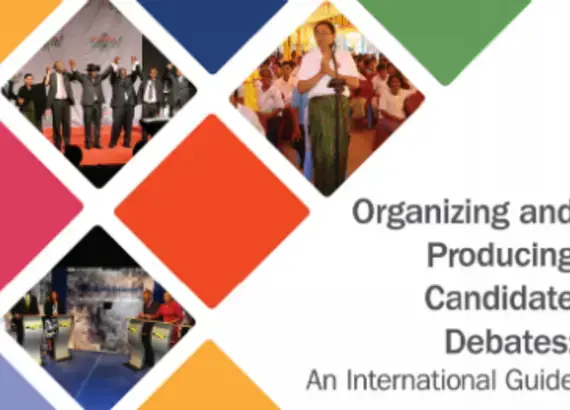
Success Story
New Guide Provides Global Approaches to Candidate Debates
Over the last decade, candidate debates have increasingly become a centerpiece of elections across a wide spectrum of democratic countries. Voters in more than 60 nations tune in to learn more about candidates running for president, prime minister, parliament or local government offices.
Debates provide a rare side-by-side and unfiltered comparison of candidates, promote accountability for campaign promises, and can help decrease political tensions and conflict.
Behind this rising global trend is the belief that there is no one best way to stage debates, that civic activists and other sponsors should organize candidate debates that reflect the history, politics and culture of their respective countries.
That principle is behind a new comprehensive 50-page guide released this month by NDI that provides information on how to organize, produce and evaluate candidate debates by drawing on lessons and examples from more than 20 countries.
Organizing a candidate debate often presents many challenges, and efforts are not always successful. Among other things, organizers must demonstrate impartiality, raise funds to finance the debate, choose a format that is informative for voters, produce a live television broadcast, and convince often reluctant candidates to participate.
Because the guide features lessons from around the globe, new debate practitioners can learn from experiences in other countries.
The guide covers a range of topics on debate production, including specifics like candidate staging and camera placement. The guide highlights the importance of featuring “the handshake” between candidates as a powerful symbol of national unity. Aspects of organizing a debate are also highlighted, including selecting appropriate moderators and formats, securing sponsors, and developing a media strategy to promote debates that can help encourage candidates to take part.
And to help organizers make candidate debates more than just one-day events and promote a culture of debate, the guide highlights trends such as efforts to establish laws that mandate candidates to participate in debates, working with young people to organize academic debate competitions, and staging post-election accountability debates to hold candidates to their campaign promises.
The guide draws on the experience of NDI and partnering organizations, including the Commission on Presidential Debates (CPD), a nonprofit, nonpartisan organization that has sponsored and produced all U.S. general election presidential and vice presidential debates since 1987; and Debates International, an 18-country association of debate sponsoring organizations and a related online debate resource center that provides a practical array of organizing checklists, pro-debate editorials from around the globe, TV production diagrams, debate videos and research on the impact of debates, among many other topics.
The guide was made possible through the support of the U.S. Agency for International Development and National Endowment for Democracy.
Read more:
Published on Feb. 17, 2015
